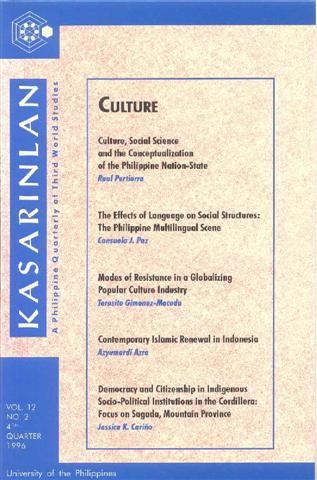Culture, Social Science, and the Conceptualization of the Philippine Nation State
Abstract
The use of culture as a transcendental justification for social order is a recent phenomenon that, paradoxically, arises out of an earlier understanding of it as amenable and negotiable. This new understanding of culture best expressed by the bourgeoisie marks the rise of a modern social consciousness making social sciences possible and enabling new forms of imagined communities like the nation-state. The modern nation-state invents the nation as its cultural expression, and the social sciences assist the nation state in constituting and reproducing itself. However, such social sciences also arise out of the conditions of civil society that, as part of the human telos, seeks universal conditions for reaching an understanding. From this perspective, social science must, and is able to criticize the narrow interests of the state and the cultural assumptions of the nation. In the Philippine case, the absence of a strong and sovereign national culture in the 19th Century prevented the development of a social science. As one began to take root following the economic changes of the 19th century, its development was interrupted by the onset of American colonization. It would take nearly a century before Filipinos confidently proclaimed their own social science perspective. But even as Philippine Social Science attempts to imagine the nation through indigenous concepts, it risks essentializing Filipinohood by reducing its differences. Instead, it should explore the rich sources of difference within civil and global society, and point out the contingent and narrow interests of states, thereby helping to establish a universal basis for understanding.
How to Cite
PERTIERRA, Raul.
Culture, Social Science, and the Conceptualization of the Philippine Nation State.
Kasarinlan: Philippine Journal of Third World Studies, [S.l.], v. 12, n. 2, july 2007.
ISSN 2012-080X.
Available at: <https://journals.upd.edu.ph/index.php/kasarinlan/article/view/1634>. Date accessed: 24 sep. 2025.
Section
Features
Keywords
Philippine National State, Culture, Social Science
By submitting a manuscript, the authors agree that the exclusive rights to reproduce and distribute the article have been given to the Third World Studies Center.



